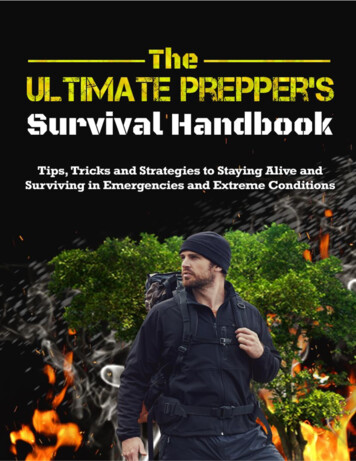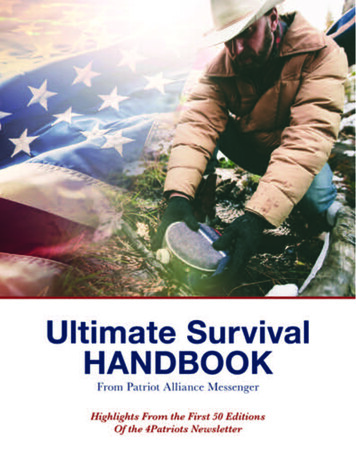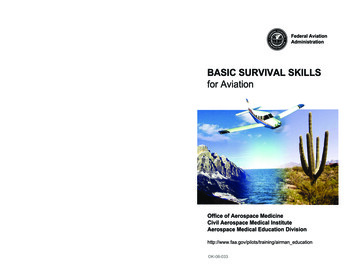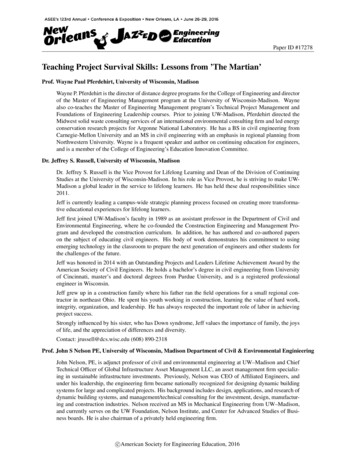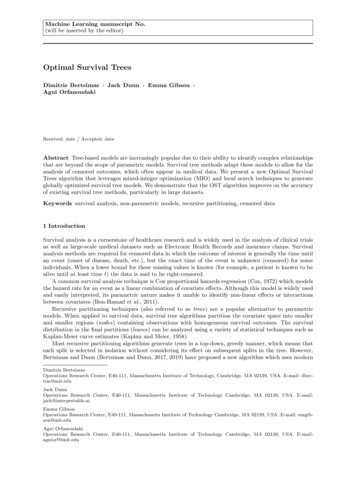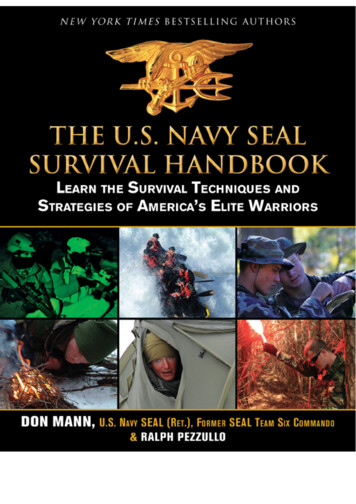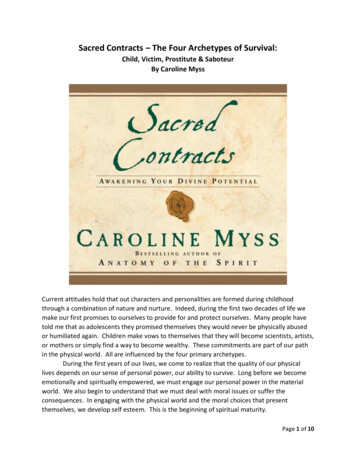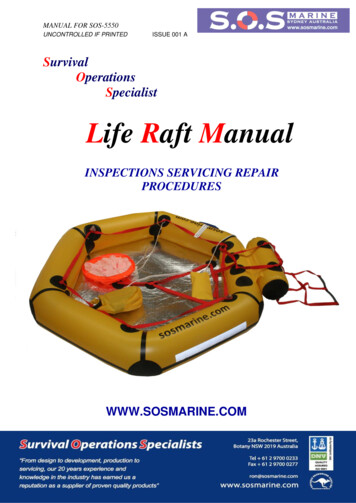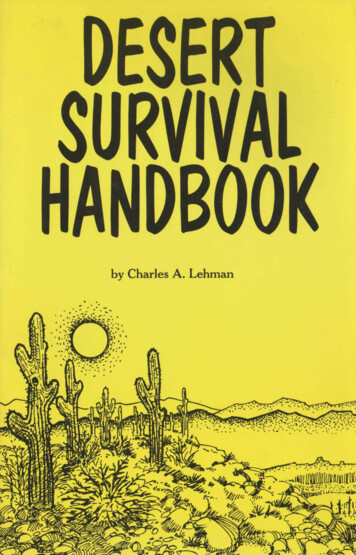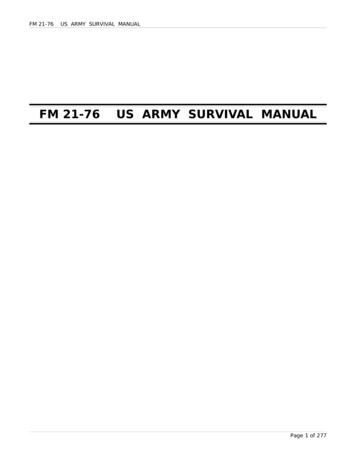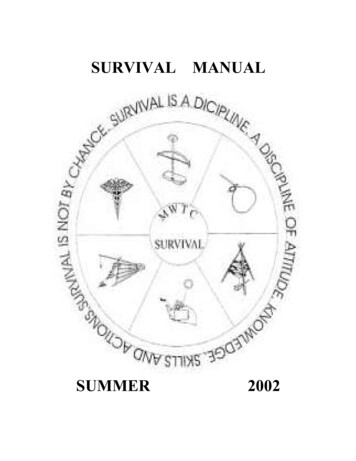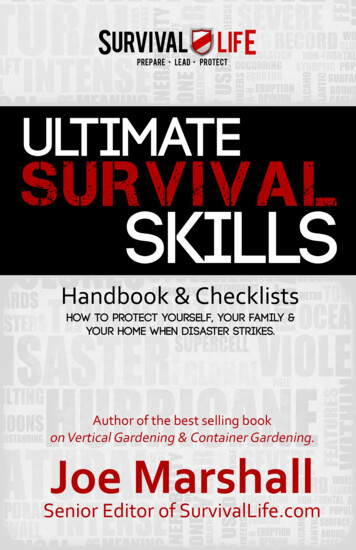
Transcription
ULTIMATE SURVIVAL SKILLSYour A-Z Guide To Preparing,Surviving, And Thriving NoMatter WhatINTRODUCTIONINSIDE THIS BOOKINTRODUCTION1GETTING DOWNTO BASICS12SAFE, SECUREAND READY TODEFEND33PLANNING51DEALING WITHOTHERS63CONCLUSION73CITATIONS77ANYTHINGCAN HAPPEN“Man can live about fortydays without food, aboutthree days without water,about eight minutes withoutair, but only for one secondwithout hope.”- AnonymousWhoever so elegantly saidthat we always need hope tosurvive surely understoodthe importance of advanceplanning. Preparing ahead forevents creates hope of survivaldespite dire situations wherefood, water, or safe shelters arein short supply.
Though “preppers” are often referred to in (implied)derogatory terms like “doomsdayers”, the fact is that ahost of natural and man-made events around the worldfrom hurricanes to war have proven that planning aheadfor disasters, or any kind of crisis no matter what form ittakes, makes sense.Preppers are not doomsdayers. They are strategicplanners who look ahead, anticipate certain events,and logically and methodically prepare to deal withthem.In other words, survival starts with an open mind andthe acknowledgment that “life happens”, and it usuallyhappens when least expected. No one anticipated a 1.5mile wide EF4 tornado would drop down on Alabama inApril, 2011 and kill 64 people, destroying or damaginghundreds of homes. The Japanese didn’t plan on atsunami in 2011, nor were Colorado Springs residentsexpecting wildfires to destroy entire neighborhoods in2012.Though many crises are natural disasters, there areplenty of man-made disasters too. The American RedCross website reports the disaster relief agency respondsto approximately 70,000 natural and man-madedisasters annually just in the U.S.1 Employee errors atelectric plants, chemical spills, financial fraud, and eventerrorism can cause small and large emergencies on a2Ultimate Survival Skills
moments notice, and the consequences of these situationscan be much bigger than the event itself. After all, theterrorist attack on New York City’s Twin Towers createdimmediate problems for New York residents before itwent on to change how Americans travel and deal withforeign threats forever.So, preppers are realists. They understand that disasterscan happen at any time, in any location, with absolutelyno warning. They do what logical, reasonable peopledo: plan and prepare in advance for the worse-case andmost likely scenarios. It is safe to say there is not a singleprepper who wants a catastrophe to occur in order to testsurvival skills.However, they do understand that should a disasteroccur, the safety and health of family members will bethreatened due to a lack of essential items like water,food or shelter. The tens of thousands of residents whoare still displaced three months after Hurricane Sandyhit the New York and New Jersey coastline in October2012, or the families huddling in hurricane damagedhomes with no power or water so they can protectremaining possessions against looters, probably wishthey had been better prepared to survive a catastrophe.Let’s face it: Urban dwellers are usually not preparedwhen the water stops flowing from the tap, the supermarket shelves are bare, there is no power for cooking3Ultimate Survival Skills
or heat, the police and fire departments cannot becontacted, and it is impossible to reach an emergencyroom.So, the bottom line is this: Survival starts with an openmind and an awareness of the various situations that canoccur. Once awareness develops, the next step is contingency planning, but for what type of disasters?ONE SIZE DOES NOT FIT ALLIt’s great to say everyone should prepare for disasters, butit is important to prepare wisely. A wise prepper looksat historical disasters to determine which ones are mostlikely to happen next.Californians know they should be prepared for earthquakes,while people living in northern states should prepare forblizzards.Gulf Coast states experience numerous hurricanes,while western states frequently battle wild fires.A riot is much more likely to occur in Chicago than it isin the small Missouri town of Sullivan. A terrorist act ismore probable in New York City than in Boise.However, a hazardous chemical spill, gas explosion, fire,4Ultimate Survival Skills
or power outage can occur in any town or city. Belowyou’ll find a list of possible disasters or events for reviewand research guidance. It will be necessary to use yourjudgment, based on where you live, concerning itemslike rioting and war.The FEMA site categorizes disasters as natural, humancaused, and technological. Their list of disasters includesthe following:21.Blizzards2.Cyber attacks (bringing down essentialcommunity services)3.Dam or levee failures4.Disease outbreaks eme heat9.Fire (wildlands or structures)10. Floods11.Food shortages (due to supplier interruptions,weather, etc.)5Ultimate Survival Skills
12. Hazardous chemicals (accidents and intentional)13. Looting14. Mudslides15.Nuclear plant disaster (radiation exposure)16. Power outages17.Riots (demonstrations)18. Structural failures (i.e. bridge collapse)19. Terrorist acts (chemical, biological, nuclear,explosives)20. Thunderstorm (severe with lightning, hail andwind)21. Tornadoes22. Tropical storm23. Tsunamis24. Volcano25. War26. Municipal water contamination or plant failure27. Winter stormsReading down the list can put fear in your heart unless6Ultimate Survival Skills
you’re willing to prepare in advance for some of thesesituations. Though it is impossible to predict the future,you can find out which of the disasters on the list aremost likely to occur in your area.After all, there is no sense storing snow shovels if thereis almost zero probability of a blizzard in your area.Therefore, the first survival step is preparing a realisticrisk assessment.You can find out what could happen or is most likely tohappen in your particular area by contacting any of thefollowing agencies or organizations:zzContact your state Emergency Preparedness Agencyand ask (listing at: http://www.aoa.gov/aoaroot/Preparedness/Resources Network/emergency preparedness.aspx)zzContact your local health departmentzzContact the local chapter of the American Red Cross (tofind local chapters: http://www.redcross.org/find-yourlocal-chapter)The questions to ask include the following:1. What specific disasters are most likely to occur inyour community?2. Can the agency send free information on preparedness?7Ultimate Survival Skills
3. Is there a public warning system, what sounds aresignaled, and what are the typical warnings for?4. What should you do when you hear the warningsystem?At this stage, you are merely collecting information inpreparation for making a plan.IT TAKES A VILLAGEContrary to popular belief, most preppers are notloners who spend their days perched in a rocking chair,shotgun at the ready, just waiting out for the Apocalypseto come. Most preppers are average men and womenwho you see every day, mowing their lawn, going to theoffice and paying their taxes. Normal. Everyday. People.And just like normal people, they have family and friendsthey will want to protect and help during a disaster.In addition, it makes sense to keep everyone informedof their roles and how they should respond in the eventof a disaster. The importance of team effort for survivalwas reinforced after Hurricane Sandy. For example,a newscaster reported on a man who had run anextension cord from his generator to an elderly woman’sheater in a next-door house, so she could have heat for8Ultimate Survival Skills
several hours each day. Other people swapped powerfor food, ensuring people were both warm and fed. Longbefore the authorities were on the scene to do anything,neighbors took care of each other.Thus, during a disaster, teamwork is important. Gettingfamily, friends and neighbors involved in a disaster planwill ensure everyone knows their responsibilities andeveryone knows where to turn to for help, if needed.The old adage “A place for everything and everythingin its place” is an apt way of thinking when it comesto involving your family and friends in disasterpreparedness planning.You can hold an informal meeting in your home andinvite anyone you want; however, your Family DisasterPlan is the most important. Just be sure to ease theminto it. If a someone is unaccustomed to a preparednesslifestyle, a sudden submersion in it can be quite a shockfor them and possibly scare them off for good.When holding the meeting below is a list each person,including children, who takes part in the planningmeeting should know:zzWhy survival planning is so importantzzThe most likely events for the area9Ultimate Survival Skills
zzHow to best respond to each type of eventzzThe importance of not letting stress lead to panic,confusion or poor decisionszzAt least 2 areas where everyone agrees to meet withoutside the home. The first one should be in theneighborhood and the second outside the neighborhoodzzHow to communicate should family and friends getseparatedzzContact information for one or more people outsidethe local area who can serve as central points ofinformation when disaster victims are separated(i.e., each person calls the contact after the disasterto let him or her know they are okay and a currentlocation)zzAn evacuation plan and route if ordered to leavethe areazzA predesignated emergency shelter for petsRemember to hold review meetings regularly with your“village” because people tend to forget the small thingsas time passes and in survival it is quite often the “smallthings” that put you in the most danger.This is especially true for children. Evacuation drills need10Ultimate Survival Skills
to be rehearsed so they become second nature. If friendsand neighbors are part of the plan, be sure to include themin drills and review meetings.It takes a village to raise children. Likewise, it also takesa village to ensure the safety and well-being of everyonein it before, during, and after a crisis.Including people in the planning process is a way toengage them and get their commitment to implementsurvival tactics when necessary.MAINTAIN A REASONABLEPERSPECTIVELike I said above, you need to ease some people into this.There are people who tend to go overboard once theydecide to become preppers. You have seen the reports ontelevision. They borrow tens of thousands of dollars, buildunderground shelters that can withstand direct nuclearbomb hits, or have enough food and water stored to lastthrough Armageddon and then some.To each his own. Even though that is the choice of aselect few, the vast majority of us simply cannot logicallygo to those lengths. It is vitally important that youbalance your life equally between work, prep, and play.11Ultimate Survival Skills
Preparing to survive a disaster should not break thebank or hurt your ability to maintain a comfortable lifenow. You are not trying to live in the future right now;you are preparing for possible events that may or maynot happen. The 10-year supply of freeze dried foodpurchased on credit does not put fresh food on yourchildren’s plates now. In other words, disaster planningshould not harm your current living status because youare so worried about your future living conditions.In the following sections, this guide will review reasonable principles, methods, and practices for preppers.First, there is a review of the basics, which are water,shelter, food, and fire. That section is followed by a discussion of safety and security, addressing securing yourshelter, basic medical care, self-defense, and the defenseof your home. The chapter on planning presents checklists to help you make important decisions like “bug inor bug out”, items needed for different time periods,and accommodations for people with special needs, likeinfants and elderly.Of course, no discussion on survival planning iscomplete until you consider how you will deal withsituations involving other people. For example, are youprepared to calm rising tensions or do you know howto barter for essential items? Do you know your capabilities and limitations? It is time to begin doing what12Ultimate Survival Skills
preppers do best.prepare!GETTING DOWN TO BASICS“Sometimes even to live is an act of courage.”- Lucius Annaeus Seneca Roman StoicPhilosopher and StatesmanSeneca died in AD 65, a time when life was rough evenon a good day, so he knew what he was talking about.However, living a full life requires courage, but livingthrough a disaster requires the courage to plan ahead.In this section, we consider the absolute basics forsurvival, which are water, shelter, fire, and food. Aperson can endure very difficult conditions as long asbasic needs are met. Therefore, as Julie Andrews sang inThe Sound of Music, “Let’s start at the very beginning, avery good place to start.”WATERWater is an excellent starting point because you canonly survive for a few days without it. The harsh truth isthat everything else becomes irrelevant if you die fromlack of water. In fact, dehydration can cause physicalproblems, like vomiting and muscle cramps, andmental problems, like fuzzy short-term memory and an13Ultimate Survival Skills
inability to do even basic math.Since we are used to having clean water available anytime, day or night, directly from our faucet, it’s difficultto imagine a water treatment plant failing, beingknocked out by a storm or cyber attack, or forced to shutdown due to water contamination. However, all of theseevents have happened.The first question is: How much water should be stored?The answer, of course, depends on whether you areplanning for a three day, three weeks, or three monthdisaster period. However, if you store for a three dayemergency event, it is important to have developedwater collection skills for longer survival events. Thesame holds true for three weeks or three months. Whatwill you drink
ULTIMATE SURVIVAL SKILLS Your A-Z Guide To Preparing, Surviving, And Thriving No Matter What ANYTHING CAN HAPPEN Whoever so elegantly said that we always need hope to File Size: 931KBPage Count: 88
